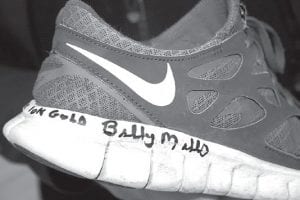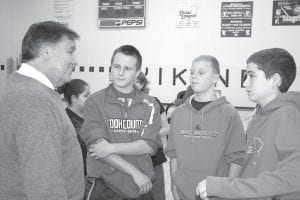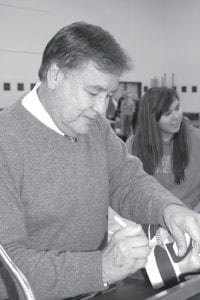Track & Field News has called Billy Mills’ upset of Ron Clarke in the 10K race at the 1964 Olympics held in Tokyo, Japan as the greatest Olympic moment in history.
It’s hard to argue with their assessment.
In Mills’ frantic sprint, the last quarter mile he was pushed out into lane 5 and almost knocked down and later, coming down the stretch in 4th place, boxed in with no way to win the race.
Except he did win, becoming the only American to ever capture gold in the 10,000 meter run at the Olympics and taking almost a full minute off of his best time in the process.
“With 90 meters to go I was passing a lapped German runner and looked over and saw an emblem of an eagle on his singlet, and that made me think of my father,” Mills told the rapt students listening to him speak on Wednesday, November 14 at 1:40 p.m. in the Cook County High School gymnasium.
With 30 meters to go Mills swung out into lane 4 as the leaders approached the tape and shocked the world with his drive to the finish. Clarke would end up 3rd and Mohammed Gammoudi of Tunisia in 2nd as the announcers screamed, “Mills wins, Mills wins, Billy Mills has just shocked the world!”
Indeed, he had, but Mills’ path to get to that point was more astonishing than his win, and as the national spokesperson for Running Strong for American Indian Youth, Mills shared his journey, his hopes, his wishes and his advice with the kids of Cook County.
Billy was born 74 years ago on the Pine Ridge Indian Reservation in South Dakota, one of the poorest reservations then (and today) in America. His mother died when he was 8. Heartbroken, his father told him something he would understand only later: “Son, you have broken wings—but some day, you’ll have wings of an eagle.”
His father then took a stick and drew a circle and had Billy stand in it and told him to close his eyes.

Olympic gold medalist Billy Mills spoke to Cook County High School students on Wednesday, November 14 and delivered a message of hope, perseverance, accountability and the responsibility of making good choices at a young age. Top: Mills (left) spent a long time talking to students after his speech. Asking additional questions were (L-R) Andrew Miller, Leo Johnson and Pete Summers. Left: After speaking Mills signed autographs, including a few on running shoes. Above: The shoe pictured belongs to Ben Seaton who could be seen walking with one shoe on and one shoe off in the halls following Mills’ speech. When asked about holding the signed shoe, Ben said, “I’m never wearing this shoe again.”
He asked Billy how he felt. “But I was young and couldn’t respond,” Billy told the students in the CCHS gym, “and he asked, ‘What do you see?’ But again, I couldn’t answer.
“Then he clapped his hands— boom! —and it startled me and he said, ‘Billy you feel anger and you feel pain because your mother died and you should expect to feel that way.
“But you probably feel some hate and some jealously because people have mistreated you and have expressed hatred to you. Jealousy because you don’t have many material things. But jealousy blinds you. You don’t see the virtue of our culture or the good in people. You have a lot of selfpity. Those emotions will destroy you.’
“And then he hugged me and told me to look deep within myself, beyond the hurt and the anger and the jealousy, because that’s where my dreams were.
“He told me to look deep within myself for the dream and said that until I found the one destiny greater then the one I picked for myself, I wouldn’t have the destiny that the Creator picks for us.”
Billy’s father passed away at age 49 when Billy was 12. As an orphan Billy was sent to a boarding school for Native Americans in Kansas. He had few material things to take with him when he left Pine Ridge. Really, all that he had were the stories his father had shared and the knowledge that his mother had loved him very much before her death. It was enough to carve out a life that has touched people globally and generated more than 100 million dollars given to charities that stretch around the world.
An Oglala Lakota (Sioux), his father shared the stories of his people with him, and Billy took them to heart. His father would tell him, “Know yourself and find your desire.” With desire comes motivation and with motivation comes work and success will follow, Mills said.
Following high school where Mills recorded a 9:08 two-mile in cross country, he earned a track scholarship to the University of Kansas and earned seven All-America honors. He wasn’t allowed to join a fraternity because, as the rhetorical question was posed to him, “What could an Indian possibly contribute to a fraternity?”
As a junior at Kansas, Mills was asked to step out of a team picture at their conference cross country meet. He was tired, not a lot had been going right, and he was emotionally fatigued. He didn’t yet know that he had always been hyperglycemic— borderline diabetic—and would often run out of energy in races or in just trying to keep up with life. He had been asked to step out of pictures several times before but this time he broke. He went back to his room and decided to commit suicide.
“I went back to my room on the fourth floor and stood on a chair and I was going to jump, and then I heard my father say, ‘Don’t. Don’t.’ I didn’t hear him through my ears but from inside. It was the Creator, I believe, sending his voice to me.
“I got off my chair and wrote that I would win the gold medal in the 10,000-meter run and added: Believe, Believe, Believe. I began training for the games right then.”
Mills married his wife Pat in college and later served as an officer in the United States Marine Corps. The couple have been married for 48 years, had three girls, and now have many grandchildren; in fact, Billy pointed to one young lady lined up for his autograph and said, “You make me homesick. You look just like one of my granddaughters!”
Robbie Benson starred in the movie Running Brave chronicling Mills life, and the two have remained friends since the film came out more then 20 years ago.
A featured speaker, Mills travels more than 300 times a year, mainly talking to American Indian youth and about making and sticking with good choices early in life.
During Mills’ running career he set one world record in the 10,000 meter run and set seven American records. His list of awards and honors stretches out a country mile; some of them include the Jackie Robinson Humanitarian Award, induction into the United States Olympic Hall of Fame, the American Hero Award granted by the National Handicapped Sports Association, and Athlete of the Century for the state of South Dakota. And surprise, surprise, the University of Kansas has bestowed a boatload of honors and awards on Mills, including, he said with a twinkle in his eye, the top alumni award.
“It’s the journey that’s important, not the destination. The daily decisions that you make now will greatly affect your future,” he told the kids, imploring them to make good decisions about school and living healthy lifestyles.
Mills also told the kids to be accountable, to have humility (no one is better, or worse, than another), to accept responsibility and to learn to love and respect themselves.
“The reason you are here is to find that uniqueness in you,” he said.
Sacrifices also have to be made. Mills said he had run about 60,000 miles before he won the gold medal. It was a long, tiring preparation and athletes at that time weren’t paid, so it was a difficult struggle financially. He had to wait until after college to put speed work into his training regime because his coach (who was awful and mean, although Mills didn’t say so) told him in a fit of sheer ignorance, “Indians are long-distance runners. Black people are sprinters.”
Following college, Mills would go from just under 60 seconds in the quarter mile to 49 seconds and he said his sprint coach told him he could possibly run in the 46-second range with more speed work. This was more then enough speed to win a gold medal then—and today.
With 75,000 people standing and cheering him at the finish line, the 26-year-old Mills put his hands on his head in amazement at what he had just accomplished.
He said that as he sprinted to the tape he heard the drum of his youth and believed he could win. He flashed back to the time when his mother had died and he borrowed a book about Olympians from the library. “Olympians are close to gods,” the book seemed to say to him.
“Maybe if I could be an Olympian I could see my mom again,” thought the brokenhearted 8-year-old boy—now an Olympian.
After the race he searched for the German runner. When he found him he was astonished to find that there was no eagle on his chest. No eagle at all. His father had found a way to be heard over the roar of the crowd and put the wings of an eagle on his feet.




Loading Comments